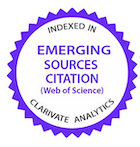Avaliação da eficácia, inocuidade e depleção residual da flavomicina em novilhos confinados
DOI:
https://doi.org/10.1590/1809-6891v23e-72054EResumo
A flavomicina é um aditivo que pertence à classe dos não ionóforos, contudo, com poucos estudos realizados com bovinos confinados em fase de terminação. Diante disso, o objetivo do presente estudo foi avaliar a eficácia da flavomicina sobre o desempenho produtivo, comportamento ingestivo, características de carcaça e os parâmetros bioquímicos de novilhos terminados em confinamento. Foram avaliados 32 novilhos inteiros, ½ sangue Angus ½ sangue Nelore, provenientes do mesmo rebanho, com idade média de 11 meses ± 1,5 meses e peso corporal inicial de 337 kg ± 6 kg. O delineamento experimental foi o de blocos casualizados, composto por dois tratamentos e oito repetições, sendo: Dieta sem flavomicina (controle) e Dieta com flavomicina (0,5 g animal dia-1 do produto FLAVIMPEX®80). Não ocorrendo diferença entre os tratamentos, o consumo de matéria seca médio dos animais foi de 10,03 kg dia-1, eficiência alimentar de 0,158 kg, ganho médio diário de 1,593 kg dia-1, digestibilidade aparente da dieta de 61,69%. O uso da flavomicina não foi eficaz no desempenho animal, assim como não trouxe alterações no comportamento ingestivo e melhorias nas características de carcaça dos animais. A Proteína Plasmática Total, Aspartato amino-transferase e creatinina foram inferiores para os animais suplementados com flavomicina em relação ao grupo controle. Em relação ao período experimental houve redução nos índices de Proteína Plasmática Total, aumento na albumina, Gama-Glutamil Transferase e ureia dos bovinos, mas todos se mantiveram dentro dos valores de referência para a espécie.
Palavras-chave: Aditivo alimentar; Comportamento ingestivo; Desempenho animal; Marcadores bioquímicos.
Downloads
Referências
Ramos MM, Berber RCA, Moreira PSA. (2019). Productive performance of Nellore steers in pasture with association of flavomycin and monensin. Sci Elect Arch. 2019; 12(2): 54-58.
Schären M, Drong C, Kiri K, Riede S, Gardener M, Meyer U, Hummel J, Urich T, Breves G, Dänicke S. Differential effects of monensin and a blend of essential oils on rumen microbiota composition of transition dairy cows. J Dairy Sci. 2017;100: 2765–2783. https://doi.org/10.3168/jds.2016-11994.
Limede AC, Marques RS, Polizel DM, Cappellozza BI, Miszura AA, Barroso JPR, Martins AS, Sardinha LA, Baggio M, Pires AV. Effects of supplementation with narasin, salinomycin, or flavomycin on performance and ruminal fermentation characteristics of Bos indicus Nellore cattle fed with forage-based diets. J Anim Sci. 2021; 99(4):1-11. https://doi.org/10.1093/jas/skab005.
Galligan D. Evaluating the cost effectiveness of feed additives. WCDS Advances in Dairy, Technology. 29nd ed; 2017. p. 147-158.
Tae-Il K, Dong-Hyun L, Sun-Sik J, Sang-Bum K, Seong-Min P, Ji-Hoo P, Kwang-Seok K, Vijayakumar M. Effects of supplementing Barodon, Bacillus subtilis, and Ampbio on growth performance, biochemical metabolites, and hormone levels in Korean native heifers. Trop Anim Health Prod. 2018;50(7): 1637-1643. https://doi.org/10.1007/s11250-018-1606-7.
Volke F, Waschipky R, Pampel A, Donnerstag A, Lantzsch G, Pfeiffer H, Richter W, Klose G, Welzel P. Characterisation of antibiotic moenomycin A interaction with phospholipid model membranes. Chem. Phys. Lipids. 1997;85(2):115–123. https://doi.org/10.1016/s0009-3084(96)02649-7.
Edwards JE, MCewan NR, Mckain N, Walker N, Wallace RJ. Influence of flavomycin on ruminal fermentation and microbial populations in sheep. Microbiology. 2005a;151(3):717-725. https://doi.org/10.1099/mic.0.27602-0.
Edrington TS, Callaway TR, Varey PD, Jung YS, Bischoff KM, Elder RO, Anderson RC, Kutter E, Brabban AD, Nisbet DJ. Effects of the antibiotic ionophores monensin, lasalocid, laidlomycin propionate and bambermycin on Salmonella and E. coli O157:H7 in vitro. J. Appl. Microbiol. 2003;94(2):207–213. https://doi.org/10.1046/j.1365-2672.2003.01822.x.
Edwards JR, Bequette BJ, Mckain N, Mcewan NR, Wallace RJ. Influence of flavomycin on microbial numbers, microbial metabolism and gut tissue protein turnover in the digestive tract of sheep. Br J Nutr. 2005b;94(1):64-70. https://doi.org/10.1079/BJN20051444.
Association of Official Analytical Chemists. Official methods of analysis. 16nd ed. Washington, DC, 1995.
Van Soest, PJ, Robertson, JB, Lewis, BA. Symposium: carbohydrate methodology, metabolism, and nutritional implications in dairy cattle. J Dairy Sci. 1991;74(10):3583-3597. https://doi.org/10.3168/jds.S0022-0302(91)78551-2.
Goering, HK, Van Soest, PJ. Forage fiber analysis: device reagents, procedures and some applications. Washington: DC, 1970.
Silva DJ, Queiroz AC. Análise de Alimentos, métodos químicos e biológicos. 3 ed; 2009.
Bolsen, KK, Ashbell, G, Weinberg, ZG. Silage fermentation and silage additives-Review. J Anim Sci. 1996;5(1): 483-494. https://doi.org/10.5713/ajas.1996.483.
Tedesco MJ, Gianello C, Bissani CA, Bohnen H, Volhweiss SJ. Análises de solo, plantas e outros materiais. 2 ed. Porto Alegre: Universidade Federal do Rio Grande do Sul; 1995. 173p.
Muller L. Normas para avaliação de carcaças e concurso de carcaça de novilhos. 2.ed. Santa Maria: Universidade Federal de Santa Maria; 1987. 31p.
Polizel DM, Cappellozza BI, Hoe F, Lopes CN, Barroso JP, Miszura A, Oliveira GB, Gobato L, Pires AV. Effects of narasin supplementation on dry matter intake and rumen fermentation characteristics of Bos indicus steers fed a high-forage diet. Transl Anim Sci. 2020;4(1):118–128. https://doi.org/10.1093/tas/txz164.
Lemos BJM, Castro FGF, Santos LS, Mendonça BPC, Couto VRM, Fernades JJR. Monensin, virginiamycin, and flavomycin in a no-roughage finishing diet fed to zebu cattle. J Anim Sci. 2016;94(1):4307–4314. https://doi.org/10.2527/jas2016-0504.
Cardoso EO, Silva RR, Silva RR, Carvalho GGP, Júnior GT, Souza SO, Lisboa MM, Pereira MMS, Mendes FBL, Almeida VVS, Oliveira AC. Influência do sexo no desempenho, característica de carcaça e viabilidade econômica de bovinos alimentados com dieta de alto grão. Semin Cienc Agrar. 2014;35(4Supl): 2643-2654. https://doi.org/10.5433/1679-0359.2014v35n4Suplp2643.
Kaneko JJ, Harvey JW, Bruss ML. Clinical biochemistry of domestic animals. 6st ed. Cambridge: Academic Press; 2008. 936p.
Neumann M, Ueno RK, Horst EH, Kowalski LH, Eto AK, Barcellos JOJ, Mizubuti IY. Production performance and safety of meat from beef cattle finished in feedlots using salinomycin in the diet. Semin Cienc Agrar. 2016;37(6):4221-4234. https://doi.org/10.5433/1679-0359.2016v37n6p4221.
Owens FN, Gill DR, Secrist DS, Coleman SW. Review of some aspects of growth and development of feedlot cattle. J Anim Sci. 1995;73(10):3152-3172. 23. Nagaraja TG, Chengappa MM. Liver abscesses in feedlot cattle: a review. J Anim Sci. 1998;76(1):287-298. https://doi.org/10.2527/1998.761287x.
Conceição WLF, Brito DRB, Rocha TG, Silva DGD, Chaves DP, Fagliari JJ. Perfil bioquímico sérico de vacas das raças nelore e girolando criadas no estado do maranhão. Ciênc. Anim Bras. 2019;20(1):1-7. https://doi.org/10.1590/1089-6891v20e-33796.
Downloads
Publicado
Como Citar
Edição
Seção
Licença
Copyright (c) 2022 Ciência Animal Brasileira / Brazilian Animal Science

Este trabalho está licenciado sob uma licença Creative Commons Attribution 4.0 International License.
Autores que publicam nesta revista concordam com os seguintes termos:
- Autores mantém os direitos autorais e concedem à revista o direito de primeira publicação, com o trabalho simultaneamente licenciado sob a Licença Creative Commons Attribution que permite o compartilhamento do trabalho com reconhecimento da autoria e publicação inicial nesta revista.
- Autores têm autorização para assumir contratos adicionais separadamente, para distribuição não-exclusiva da versão do trabalho publicada nesta revista (ex.: publicar em repositório institucional ou como capítulo de livro), com reconhecimento de autoria e publicação inicial nesta revista.
- Autores têm permissão e são estimulados a publicar e distribuir seu trabalho online (ex.: em repositórios institucionais ou na sua página pessoal) a qualquer ponto antes ou durante o processo editorial, já que isso pode gerar alterações produtivas, bem como aumentar o impacto e a citação do trabalho publicado (Veja O Efeito do Acesso Livre).






























